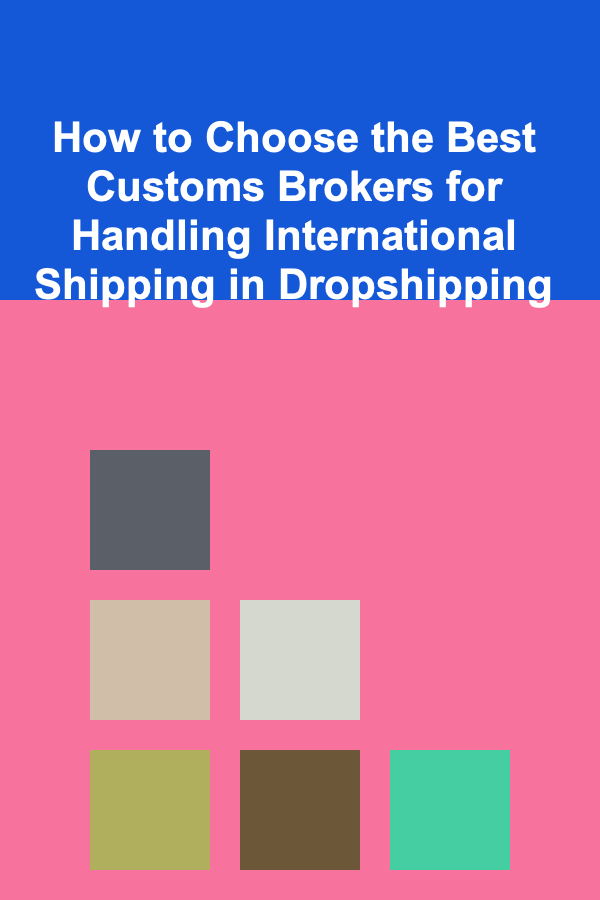
How to Choose the Best Customs Brokers for Handling International Shipping in Dropshipping
ebook include PDF & Audio bundle (Micro Guide)
$12.99$8.99
Limited Time Offer! Order within the next:

When it comes to dropshipping, one of the critical aspects of ensuring smooth and successful international shipping is choosing the right customs broker. A customs broker plays a vital role in ensuring your products clear customs without any hiccups, helping you avoid delays, fines, or even the seizure of goods. Since dropshipping businesses often deal with international suppliers and customers, finding the best customs broker for handling international shipments is crucial. This actionable guide will help you navigate the process of choosing the right customs broker for your dropshipping needs.
Understanding the Role of a Customs Broker in Dropshipping
A customs broker is a licensed professional or firm responsible for clearing goods through customs on behalf of importers and exporters. They ensure that shipments comply with all relevant customs regulations, handle paperwork, and make sure duties and taxes are paid. In dropshipping, this is especially important as your business often involves goods being shipped from one country to another, and customs laws can vary significantly between different regions.
Why You Need a Customs Broker for Dropshipping:
- Regulatory Compliance: Different countries have different customs rules, tariffs, and regulations. A customs broker ensures your shipments meet all the necessary requirements.
- Reducing Delays: Improper or incomplete paperwork can delay shipments. A broker ensures that everything is filed correctly and in a timely manner, reducing the chance of delays.
- Managing Costs: Brokers help determine duties, taxes, and other fees, allowing you to accurately calculate the cost of shipping and avoid unexpected expenses.
- Smooth Customer Experience: With a customs broker handling the logistics, you can provide a better experience for your customers, ensuring timely delivery of their orders.
Factors to Consider When Choosing a Customs Broker for Dropshipping
Choosing a customs broker isn't a decision to be made lightly. It's crucial to select one that aligns with your business needs, budget, and values. Below are key factors to help you make an informed decision.
1. Experience with International Shipping
One of the most critical factors to look for is the broker's experience with international shipping, especially in the dropshipping sector. Since dropshipping often involves shipping products from countries with complex import/export regulations, your customs broker should have a robust understanding of global trade and the various customs policies that apply to different countries.
What to Look For:
- Familiarity with Dropshipping: A broker who understands the dropshipping model can help streamline the process for your business. Since dropshipping involves working with third-party suppliers, you want a broker that can handle complex situations that arise from shipping to multiple countries.
- Specialization in Key Countries: Depending on where you ship products to, ensure the broker has expertise in those specific regions (e.g., the European Union, the U.S., or China).
2. Licensing and Certification
A reputable customs broker should be licensed and certified to handle international shipments. In many countries, customs brokers must pass exams and meet specific criteria before being granted a license. Without a licensed broker, your business could face legal issues or penalties for improper clearance of goods.
What to Look For:
- Licensed and Certified Brokers: In the U.S., for example, a licensed Customs Broker has passed exams and has a deep understanding of U.S. customs laws.
- Global Affiliations : Check if the broker is affiliated with global organizations such as the Customs Brokers & Freight Forwarders Association (CBFCA) or the International Federation of Customs Brokers Associations (IFCBA). This shows the broker's commitment to adhering to global standards and best practices.
3. Technology and Integration with Your Ecommerce Platform
In today's digital age, efficiency is key. A broker who offers technological solutions, such as software that integrates with your dropshipping platform, can save you time and reduce the likelihood of errors. This is especially true when managing international orders from multiple suppliers.
What to Look For:
- E-commerce Integration: Many customs brokers now provide software or APIs that integrate with your existing ecommerce platforms (e.g., Shopify, WooCommerce, BigCommerce). This integration can automatically handle customs documentation and calculate duties, taxes, and other necessary fees.
- Tracking Capabilities: Brokers offering shipment tracking tools can help you monitor your products from the moment they leave the supplier to when they reach the customer. This allows you to keep customers updated, enhancing their overall experience.
- Automated Document Filing: Technology that automates the filing of customs documents can reduce errors, streamline the process, and ensure timely delivery.
4. Transparent Pricing Structure
Customs brokerage fees can vary significantly based on the complexity of the shipment, the countries involved, and the type of goods being shipped. It's important to choose a customs broker who offers a clear and transparent pricing structure, so you can plan your shipping costs accordingly.
What to Look For:
- Clear Breakdown of Fees: Make sure the broker provides an itemized list of all fees, including handling charges, customs duties, import taxes, and any other potential costs.
- Predictable Costs: A reliable broker should offer clear estimates of the total costs, including additional fees or unexpected charges that could arise during customs clearance.
- Flexible Payment Terms: Some brokers may offer flexible payment options for your convenience. Look for brokers that can work with your payment terms, especially if you're managing international suppliers and customers on tight margins.
5. Customer Support and Communication
As a dropshipping business owner, you need a customs broker that offers exceptional customer support and clear communication, especially when dealing with time-sensitive issues. Shipping delays or customs issues can hurt your reputation, so timely communication is critical.
What to Look For:
- Responsiveness: A good customs broker should be easily reachable through email, phone, or live chat. They should also offer quick responses to your inquiries, whether you're dealing with a customs delay or need advice on shipping regulations.
- Proactive Communication: Choose a broker who notifies you in advance about any potential issues that may arise during the shipping process (e.g., missing documentation or shipment delays).
- Multilingual Support: If you're dealing with international shipments, having a broker who provides multilingual support can help navigate language barriers, ensuring smoother interactions.
6. Reputation and Reviews
Like any service provider, the reputation of a customs broker is a key factor in determining whether they're the right fit for your business. A broker with a solid reputation is more likely to be reliable, professional, and efficient in handling your shipments.
What to Look For:
- Online Reviews: Look for reviews and testimonials from other businesses in the dropshipping or ecommerce industry. If others have had positive experiences with the broker, it's a good indicator of their trustworthiness.
- Referrals: Ask other dropshippers or ecommerce business owners for recommendations. Peer referrals can provide valuable insights into how well a broker performs in real-world scenarios.
- Case Studies or Success Stories: Many top-tier brokers offer case studies or success stories on their website. This can help you understand how they've successfully handled international shipments for businesses similar to yours.
7. Flexibility and Scalability
As your dropshipping business grows, so will your shipping needs. It's important to select a customs broker who can scale with your business. A flexible broker will be able to accommodate a wider range of shipping needs, including handling shipments of varying sizes and complexities.
What to Look For:
- Adaptable Services: Ensure that the broker can handle different types of shipments, whether you're sending small packages or bulk orders.
- Global Network: A broker with a network of partners and affiliates across various regions can help your business expand without the need to find new brokers for different markets.
- Future-Proofing: Ask about the broker's ability to keep up with evolving customs regulations, tariffs, and trade policies to ensure your business remains compliant as it grows.
Final Thoughts
Choosing the best customs broker for your dropshipping business is essential for smooth international shipping. The right broker will help you navigate complex customs laws, minimize delays, and ensure your customers receive their orders on time. By considering factors such as experience, licensing, pricing, and communication, you can find a customs broker that meets your needs and supports your business's growth. Take the time to research and evaluate different brokers, as the right partnership will save you time, reduce risks, and contribute to the long-term success of your dropshipping venture.

Environmental Science: Investigating Key Issues in Ecology and Conservation
Read More
How to Create a Photo Calendar as a Unique Gift
Read More
How to Implement Vertical Gardens for Urban Living
Read More
How to Incorporate Vintage Elements into Your Home Renovation
Read More
How to Set the Perfect Holiday Mood with Lights and Soft Furnishings
Read More
The Environmental Consultant's Guide: Strategies for Sustainable Solutions
Read MoreOther Products

Environmental Science: Investigating Key Issues in Ecology and Conservation
Read More
How to Create a Photo Calendar as a Unique Gift
Read More
How to Implement Vertical Gardens for Urban Living
Read More
How to Incorporate Vintage Elements into Your Home Renovation
Read More
How to Set the Perfect Holiday Mood with Lights and Soft Furnishings
Read More